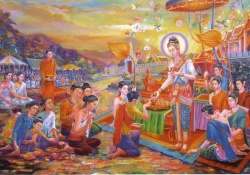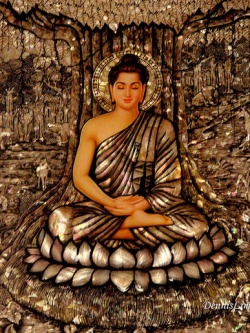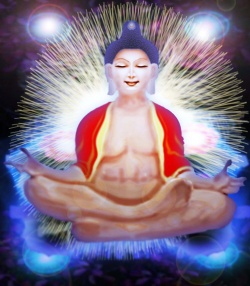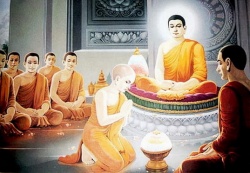Difference between revisions of "Basic Buddhist Principles"
m (Text replacement - "[[[" to "([[") |
|||
| Line 76: | Line 76: | ||
[[File:13sd.jpg|thumb|250px|]] | [[File:13sd.jpg|thumb|250px|]] | ||
In the words of [[Buddhadasa Bhikkhu]]: | In the words of [[Buddhadasa Bhikkhu]]: | ||
| − | :“There is no one best way to prepare for [[death]], except to let go of [the [[clinging]] to] your [[mind]] and [[body]]. After all, there is no [[death]] of any particular ‘[[self]].’ The [[enlightened mind]] will realize there is no ‘us’ who was born, grows old, succumbs to {{Wiki|illness}} and [[dies]]. There are only [[mental formations]] that arise in accordance with the Law of Idappacayata | + | :“There is no one best way to prepare for [[death]], except to let go of [the [[clinging]] to] your [[mind]] and [[body]]. After all, there is no [[death]] of any particular ‘[[self]].’ The [[enlightened mind]] will realize there is no ‘us’ who was born, grows old, succumbs to {{Wiki|illness}} and [[dies]]. There are only [[mental formations]] that arise in accordance with the Law of Idappacayata ([[Conditionality]]]. As long as the [[mind]] still clings to [[self]], [[old age]], [[sickness]], and [[death]] will prevail. If there is [[no self]], everything is part of the course of [[nature]]. There will be no problems. There will be no [[suffering]]. Thus is [[life]].” |
Aside from this, most [[Thai]] [[Buddhists]] [[people]] in the fundamental [[principle]] of [[reincarnation]] — if we do not get it right the first [[time]], we’ll be right back. Consequently, they are much less pressing about some of these issues than impatient westerners might be. They are in for the long haul. Lucien Hanks has put this very well in an article that, ounce for ounce, is still one of the best summaries of the [[Thai]] worldview: “As good [[Buddhists]], the [[Thai]] {{Wiki|perceive}} that [[all living beings]] stand in a {{Wiki|hierarchy}} of varying ability to make [[actions]] effective and of varying degrees of freedom from [[suffering]]. As [[actions]] become more effective, [[beings]] [[suffer]] less; the two vary together; such is the [[nature]] of [[existence]]” (“[[Merit]] and Power in the [[Thai]] {{Wiki|Social}} Order,” American Anthropologist 64, p. 1247) | Aside from this, most [[Thai]] [[Buddhists]] [[people]] in the fundamental [[principle]] of [[reincarnation]] — if we do not get it right the first [[time]], we’ll be right back. Consequently, they are much less pressing about some of these issues than impatient westerners might be. They are in for the long haul. Lucien Hanks has put this very well in an article that, ounce for ounce, is still one of the best summaries of the [[Thai]] worldview: “As good [[Buddhists]], the [[Thai]] {{Wiki|perceive}} that [[all living beings]] stand in a {{Wiki|hierarchy}} of varying ability to make [[actions]] effective and of varying degrees of freedom from [[suffering]]. As [[actions]] become more effective, [[beings]] [[suffer]] less; the two vary together; such is the [[nature]] of [[existence]]” (“[[Merit]] and Power in the [[Thai]] {{Wiki|Social}} Order,” American Anthropologist 64, p. 1247) | ||
Revision as of 14:13, 3 April 2016
When we begin to talk about the Buddhist principles, we will inevitably return to a discussion of the mind. This may be somewhat different from other world religions. The first two opening stanzas of the Dhammapada — one of the most well-known collections of Buddhist verses — starts with the following:
I
Mind is the forerunner of all mental conditions,
mind is chief, mind-made are they;
if a person speaks or acts with an evil mind,
then suffering will surely follow
just as the wheel follows the hoof of the ox.
II
Mind is the forerunner of all mental conditions,
mind is chief, mind-made are they;
if a person speaks or acts with a pure mind,
then happiness will surely follow
like a (cool) shadow that is never left behind.
Like other religions, Buddhism talks about the importance of discipline and ethics, but when it comes down to a real discussion of Buddhist principles, the talk always comes back to the nature of mind. The name Buddha means ‘to awaken’ and the ultimate goal of Buddhism, nibbana, means ‘blown out’, to be ‘cool’. Everyday Thai terms reflect this influence. It is very common to hear people reminding each other to take it easy, to chill out, as we now say. One of the most common Thai phrases is chai yen-yen, keep a cool heart. While we may try to trace such concepts directly to Buddhist principles, it is difficult to do so. Perhaps we are better off saying that the presence of Buddhism in Thailand has traditionally supported such values.
The Thai language also makes very little distinction between the heart (chai) and mind (chit); in fact most often they are referred to as one, with the compound chit-chai. New students of Thai are often fascinated by the abundance of so-called “chai words” used to describe feeling and mental states.
Let’s start with a politically incorrect joke that will help to illustrate a Buddhist perspective. (I will pick on the Swedes because I am Swedish.)
An Irishman, a Mexican and a Swede were doing construction work on the 20th floor of a new building. They were on lunch break and the Irishman said, “Corned beef and cabbage again! If I have to eat this for lunch one more time, I am going to jump off this building!”
The Mexican opened his lunchbox and exclaimed, “Burritos again! If I get burritos one more time, I’m gonna leap off of here too!”
The Swede opened his lunch bag and said, “Uff da, lefse again! If I hafta eat lefse for lunch one more time, I’m gonna take a leap off of here!”
The next day, the Irishman found corned beef and cabbage and jumped to his death. The Mexican found you-know-what and jumped too. The Swede found lefse and leapt after them.
At the funeral, the Irishman’s wife was weeping and declared that if she had known how tired of corned beef he was, she would never have served it again. The Mexican’s wife said the same about her burritos. Then everyone stared at the Swede’s wife who was weeping profusely: “Don’t look at me, he packs his own lunch...”
As far as Buddhism is concerned, we pack our own lunches. There is no god to blame the world’s problems on, and we are not allowed to commiserate over our (predetermined) fate. We (and the world) are made up of compounded things subject to the impact of nature and surrounding conditions. This notion of compounded things (sankhara) applies to our physical being as well as all thought. In other words, as we grow, we are exposed to a number of changing conditions that affect us in various ways. We use our mind to try and study these things. And one of the most tricky activities is using the mind to study the mind. One Buddhist doctor in Thailand, Prawase Wasi, told me that the Buddhist task involves trying to figure out how we were programmed (by parents, teachers, friends, the government, and so on...) and to reprogram ourselves.
The Buddhist principles are divided into many lists and groupings. If you ask a monk about a Buddhist principle, chances are he will relate the context of the list in which this principle appears and then proceed with an explanation. Since the days of oral history, chanting lists was an easy way to remember and pass on such sets of principles. One such set of three principles that has an impact on everyday life in Thailand is called the Three Characteristics of Existence (trailak):
1) Dukkha — Often this term is translated as suffering; but there is even a tradition of translating this term as dissatisfactoriness. However, we hardly ever hear anyone use the term dissatisfactoriness, and for a concept as fundamental to human existence as dukkha, this does not ring very true. Rather, dukkha tends to refer to anxieties experienced in the course of living. If you set a goal and are experiencing difficulty attaining it, this can be dukkha. If you love someone and that person does not reciprocate, that may amount to dukkha. If you try and control your child and that child seeks his or her own way, this could become dukkha. Let us say, dukkha implies a gap. There is nothing wrong with goals and gaps (Buddhism has occasionally been criticized for making people lazy or lackluster; and this is simply not true). It is when a gap cannot be managed that one experiences dukkha. Often the metaphor for progress in Buddhism is a path. If you are not able to attain your goal step by step you may become frustrated. Again, the gap is not the problem, it is how you perceive it and how you deal with it that matters most.
2) Anicca — This is impermanence. All things are subject to the forces of nature. Even the rock is gradually worn down by the incessant rain drops. Intellectually, at least, this principle is not that hard to understand.
3) Anatta — This is one of the most challenging concepts in the Buddhist teachings. (I am sure that we could devote another website to nothing but this idea.) Anatta is often translated as no-self or not-self. This idea relates to the non-substantiality of self or personality. In other words, the self or soul that we may believe is ours does not really exist. There is nothing to cling to. In the West, we often hear people proclaim that they are seeking to find their “real self” — for Buddhists there is no such thing. According to Buddhism, we are very lucky to have been born in a form that tends to maintain its shape as we move from task to task. Our compounded form comes into contact with nature and must fight disease, discomfort, and changing conditions. Since there is no essence, no constant state of being, we are subject to many different (impermanent) conditions. Furthermore, how we perceive ourselves may not be the way that others perceive us. We must meet others and the changing conditions around us with a flexibility (grounded in the spirit of ethics). If we do not adjust our self when conditions change, dukkha will most likely follow.
The Thai people use the terms dukkha (thuk) and anicca (anichang) often in daily speech. They tend to be relatively open to change and accepting loss, but this does not mean that they simply accept fate blindly. Understanding fate and the momentum of karma is different from being fatalistic.
A synonym for the Buddhist teachings is The Middle Path. This notion does not mean taking a position of compromise between two extremes. It is possible that both positions under consideration could be wrong or inappropriate. Following the Middle Path involves knowledge of the letter and the spirit of the law. In Thailand, preserving the human spirit usually takes precedence over an application of the letter of the law. Some people have suggested that the value of The Middle Path has made Thai people non-committal and wishy-washy — there may be some truth to this. The Middle Path can be very slippery indeed.
Other common principles include:
1) dukkha happens
2) dukkha has a cause
3) we can put an end to dukkha
4) there is a means to putting an end to dukkha...and that is...
The Eight-fold Path
1) proper understanding
2) proper thought
3) proper speech
4) proper action
5) proper livelihood
6) proper effort
7) proper mindfulness
8) proper concentration
The goal of Buddhism is to rid our lives of the effects of dukkha. Due to the nature of our physical and mental being, we are still vulnerable to “slings and arrows” of existence, but we do not have to let these things hurt us deeply. As the song says, “I get knocked down, but I get up again.”
We will discuss the dynamic psychological notions of dukkha in the next aspect dealing with meditation.
Modern studies of Buddhism have delved into the “scientific” aspects of Buddhist causality, such as dependent origination (paticcasamuppada) and, especially in the case of Buddhadasa Bhikkhu, idappacayata.
In the words of Buddhadasa Bhikkhu:
- “There is no one best way to prepare for death, except to let go of [the clinging to] your mind and body. After all, there is no death of any particular ‘self.’ The enlightened mind will realize there is no ‘us’ who was born, grows old, succumbs to illness and dies. There are only mental formations that arise in accordance with the Law of Idappacayata (Conditionality]. As long as the mind still clings to self, old age, sickness, and death will prevail. If there is no self, everything is part of the course of nature. There will be no problems. There will be no suffering. Thus is life.”
Aside from this, most Thai Buddhists people in the fundamental principle of reincarnation — if we do not get it right the first time, we’ll be right back. Consequently, they are much less pressing about some of these issues than impatient westerners might be. They are in for the long haul. Lucien Hanks has put this very well in an article that, ounce for ounce, is still one of the best summaries of the Thai worldview: “As good Buddhists, the Thai perceive that all living beings stand in a hierarchy of varying ability to make actions effective and of varying degrees of freedom from suffering. As actions become more effective, beings suffer less; the two vary together; such is the nature of existence” (“Merit and Power in the Thai Social Order,” American Anthropologist 64, p. 1247)
Thais in turn make merit to improve their position in the cosmological hierarchy, even though, paradoxically, the loftiest Buddhist teachings suggest that there can be no personal store of merit. Thais often rationalize this by stating that they are still at the worldly level of practice (lokiya or sammuti-sacca) and that they will have to wait until they (are reincarnated) to devote themselves to the higher practices (lokuttara or paramattha sacca). But we are getting ahead ot ourselves; this paradox will constitute our second path (at the bottom of the aspects page).
It is important to remember that there are Three Jewels to Buddhism, which represent different dimensions of spirituality: The Buddha (personhood), The Dhamma (body of teachings/the nature of things, The Sangha (the community). In other words, there are people who observe and practice the teachings in the world around them, and they make up a community of believers living (presumeably happily) together.
While some people believe they can go it alone, there is really no substitute for finding a good teacher and having wise, supportive friends. Since all things are inter-dependent, the advice of a good teacher is an extremely valuable asset. And Lord Buddha said that good friends are not just a part of the path, they are the path.
And close to the bottomless bottom line: Thai people generally believe that rituals should be fun. I remember returning from my first Thai funeral. My Thai mom asked me: Was it fun (sanuk)? And I was taken aback. The word for work, party, and festival is the same in Thai — ngan. The word for a temple fair is ngan wat. We should keep this spirit in mind when studying Buddhist principles in the Thai context.



